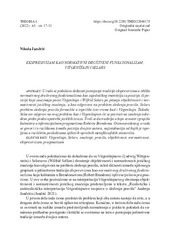Приказ основних података о документу
Ekspresivizam kao normativni društveni funkcionalizam: Vitgenštajn i Selars
Expressivism as normative social functionalism: Wittgenstein and Sellars
| dc.creator | Jandrić, Nikola | |
| dc.date.accessioned | 2023-10-19T17:48:17Z | |
| dc.date.available | 2023-10-19T17:48:17Z | |
| dc.date.issued | 2022 | |
| dc.identifier.issn | 2683-3867 | |
| dc.identifier.uri | http://reff.f.bg.ac.rs/handle/123456789/5026 | |
| dc.description.abstract | U radu se pokušava dokazati postojanje tradicije ekspresivizma u obliku normativnog društvenog funkcionalizma kao zajedničkog imenitelja za poziciju ili po- zicije koje zauzimaju pozni Vitgenštajn i Wilfrid Selars po pitanju objektivnosti i nor- mativnosti jezičkog značenja, a kao odgovora na problem sleđenja pravila. Selars problem sleđenja pravila formuliše u otprilike isto vreme kad i Vitgenštajn. Takođe, Selarsov odgovor na ovaj problem, kao i Vitgenštajnov će se pozivati na značenje odre- đeno preko praksi upotrebe jezičkih izraza. Tvrdi se da tradicija u koju se autori grupišu kulminira u inferencijalnom pragmatizmu Roberta Brendoma. Osim navedenog, u radu se govori i o razlikama između pozicija dvojice autora, najistaknutija od kojih je ispo- ljena u različitim posledicama njihovih oprečnih metafilozofskih stanovišta. | sr |
| dc.description.abstract | In the text it will be attempted to prove the existence of a tradition of expressivism in the form of normative social functionalism as the common denominator for the position or positions taken by the later Wittgenstein and Wilfrid Sellars in regards to questions of objectivity and normativity of lingustic meaning, presented as answers to the problem of rule following. Sellars formulates the problem of rule following at approximately the same time as does Wittgenstein. Also, Sellars’ answer to this problem, as does Wittgenstein’s will call upon meaning as determined by the practices of use of lingustic expressions. It is claimed that the tradition that clusters the authors culminates in inferential pragmatism of Robert Brandom. Apart from the above, the paper also discusses the differences between the positions of the said authors, the most prominent of which is manifested in the different consequences of their contrary metaphilosophical attitudes. | sr |
| dc.language.iso | sr | sr |
| dc.publisher | Filozofsko društvo Srbije | sr |
| dc.rights | openAccess | sr |
| dc.rights.uri | https://creativecommons.org/licenses/by/4.0/ | |
| dc.source | Theoria, Beograd | sr |
| dc.subject | Vitgenštajn | sr |
| dc.subject | Selars | sr |
| dc.subject | značenje | sr |
| dc.subject | pravila | sr |
| dc.subject | objektivnost | sr |
| dc.subject | normativnost | sr |
| dc.subject | ekspresivizam | sr |
| dc.subject | pragmatizam | sr |
| dc.subject | Wittgenstein | sr |
| dc.subject | Sellars | sr |
| dc.subject | meaning | sr |
| dc.subject | rules | sr |
| dc.subject | objectivity | sr |
| dc.subject | normativity | sr |
| dc.subject | expressivism | sr |
| dc.subject | pragmatism | sr |
| dc.title | Ekspresivizam kao normativni društveni funkcionalizam: Vitgenštajn i Selars | sr |
| dc.title | Expressivism as normative social functionalism: Wittgenstein and Sellars | sr |
| dc.type | article | sr |
| dc.rights.license | BY | sr |
| dc.citation.epage | 31 | |
| dc.citation.issue | 4 | |
| dc.citation.rank | M24 | |
| dc.citation.spage | 17 | |
| dc.citation.volume | 65 | |
| dc.identifier.doi | 10.2298/THEO2204017J | |
| dc.identifier.fulltext | http://reff.f.bg.ac.rs/bitstream/id/12361/0351-22742204017J.pdf | |
| dc.type.version | publishedVersion | sr |

